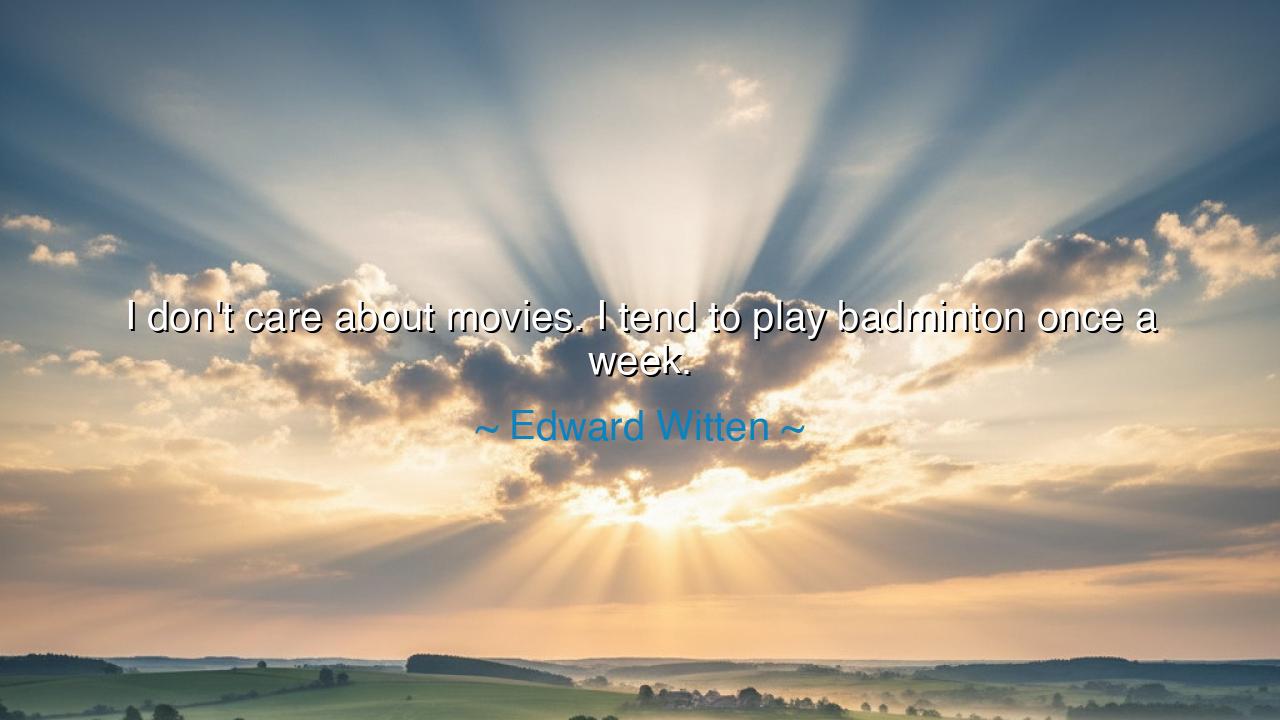
I don't care about movies. I tend to play badminton once a week.






"I don't care about movies. I tend to play badminton once a week." These words, spoken by the brilliant physicist Edward Witten, offer a profound insight into the nature of focus and the pursuit of knowledge. In this brief and seemingly simple statement, Witten is not merely expressing a lack of interest in movies, but a deeper reflection on where he places his energy and attention. In a world increasingly obsessed with entertainment and the distractions of modern life, Witten’s words serve as a reminder of the importance of prioritization—of directing one’s time and efforts toward that which truly matters, rather than being caught in the noise of external influences.
Witten’s choice to emphasize a humble pastime like playing badminton rather than engaging with the glamour of movies or popular culture speaks to his commitment to a life of intellectual rigor and clarity. Badminton, a game that requires focus, agility, and discipline, becomes symbolic of the kind of balance that Witten seeks in his life. It is a reminder that the pursuit of knowledge and understanding does not necessitate an escape into the realms of superficial entertainment. Instead, it is often found in simpler, more grounded activities that allow one to sharpen the mind while nourishing the body and spirit.
In the context of history, we are reminded of the great thinkers who, like Witten, chose a path of deep focus over distractions. Consider the life of Isaac Newton, a man whose mind sought to unlock the mysteries of the universe. Newton famously retreated into solitude, turning away from distractions to study the world around him, forging a legacy that has lasted for centuries. His dedication to understanding the laws of nature led him to discover some of the most profound truths of mathematics and physics, yet he too was known to seek moments of personal simplicity—whether in contemplation or in simpler pleasures. Newton’s life was defined not by the pursuit of fleeting entertainment but by a relentless commitment to a singular purpose.
Witten’s statement also reflects the value of introspection and personal discipline in the age of endless distractions. In today’s world, where entertainment is often just a click away, there is a profound temptation to fill our time with movies, television, social media, and other forms of quick gratification. But Witten, in his humility, calls us to consider whether such distractions truly contribute to our growth or whether they merely keep us from the deeper callings within us. This is not to say that entertainment is inherently bad, but rather that, as in all things, there must be balance—a balance between leisure and focus, between enjoyment and intellectual pursuit.
The lesson to be drawn from Witten’s words is one of clarity of purpose. To succeed in any field, to understand the deeper truths of life, we must resist the temptation to drown in the superficial. Just as Witten uses his weekly badminton game as a way to maintain focus and energy, so too must we seek out activities that center our minds, nourish our spirits, and allow us to continue the pursuit of that which truly matters. Whether it is through study, physical exercise, or meditation, the principle remains the same: balance is key.
In practical terms, we must ask ourselves: how much of our time is consumed by distractions, by things that offer little substance? How much of our energy is drained by the constant pull of the modern world? Witten’s example urges us to turn away from mindless consumption and instead seek those activities that bring us closer to our true selves. Whether through quiet study, engaging in simple hobbies, or engaging with nature, we must recognize the power of intentionality in how we spend our time.
In conclusion, Edward Witten’s statement invites us to reflect on the nature of our pursuits and priorities. While movies and entertainment may offer fleeting pleasure, it is the quieter, more focused moments of life—like playing badminton or engaging in meaningful intellectual work—that shape us into the people we are meant to become. The key lies in finding balance, in investing time into what fuels the mind and spirit, and in recognizing that true growth often comes from within, not from the distractions of the world around us. Thus, let us commit to a life of focus, of disciplined inquiry, and of deliberate choices that elevate us toward our highest potential.






AAdministratorAdministrator
Welcome, honored guests. Please leave a comment, we will respond soon